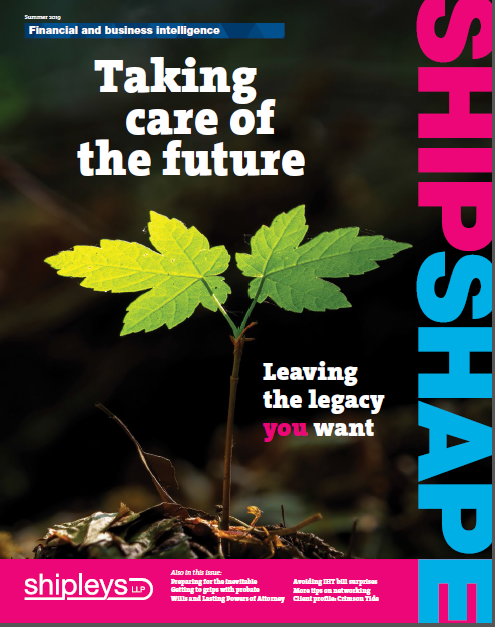
Simon Robinson’s Viewpoint
All that you can’t leave behind
Unbelievably, we’re already over halfway through the year and it’s been quite a rollercoaster. Aside from the cricket and Brexit antics, the year so far has also seen a further swell of public opinion and passion about the state of the planet. We touched on this in our Going Green Shipshape last winter but, over recent months, campaigns for climate change and reducing plastic waste have only intensified, revealing a strong sentiment to improve the legacy current generations are passing to the next.
Aside from lobbying and campaigning, people are also considering their personal impact and are clearly starting to change their habits, purchasing preferences and lifestyle choices; firms and employers need to adapt accordingly.
How we want to be remembered, and the legacy we leave, therefore seems at the forefront of people’s minds.
So how do you ensure your legacy does indeed have the effect you want? Well, a good starting point is to have a will that reflects your wishes. This helps you specify what’s to be done with, and who is to benefit from, your assets – whether that’s a business, cash or property.
I remember you
When it comes to a legacy, no one is a fan of paying inheritance tax (IHT). It’s seen as an unfair tax on lifetime earnings you’ve already paid tax on. But like it or not, failing to plan for IHT can mean the taxman gets a bigger slice of your estate than need be.
Despite the much-publicised changes that will lead to the scrapping of IHT on £1m homes by 2020/21, soaring house prices (especially in London and the South East) mean this kind of relief might not have the impact many people hoped for. If your overall estate is worth more than £2m, you may not qualify for the exemption at all. That also presupposes we still have a
Conservative government by then.
All this means a will and IHT planning are important when considering your personal legacy or business succession plan, which is why in this Shipshape, we’ve outlined some simple steps to take. We also have the know how to guide you through the process.
Give it away
It’s worth mentioning that when people leave money to charity in their will, it’s often in the form of a fixed amount.
With the current IHT rules, it’s sometimes better to leave a percentage of your estate instead. Leaving money to charity in a legacy is tax free and reduces the value of your estate ahead of applying IHT.
If you leave, say, 10% of your chargeable estate to a charity, this can bring your IHT liability down from 40% to 36%.
So, if you’re likely to exceed the threshold where IHT is charged on your estate, you could consider leaving your charitable legacy in percentage terms. There are also other ways you can support charities tax-efficiently, such as gifting shares or creating a charitable trust. Ask your Shipleys contact for more information.
Let’s get married
Unmarried couples have distinct tax disadvantages both for IHT and other taxes when transferring assets. It was good to hear of the decision this March to extend the right to civil Partnerships to mixed-sex couples.
Like their married peers, opposite-sex civil partners will be able to inherit their partners’ assets free of IHT, and have automatic rights in certain circumstances – including to their pension. And, again, like married couples, they will be able to inherit their partners’ unused IHT allowances on their death.
Further legislation and clarification for mixed-sex civil partnership rights is expected by the end of the year. For the latest updates visit www.equalcivilpartnerships.org.uk
Celebrate!
Finally, I’d like to pass on my best wishes to Terry Bourne, who became a Shipleys Principal in May. Terry helps clients ranging from owner-managed businesses to larger groups and AIM-listed PLCs with their accounting, audit and tax needs. It’s good to know that the legacy of Mr Shipley and Mr Blackburn (our founders) continues.
Enjoy the read.










